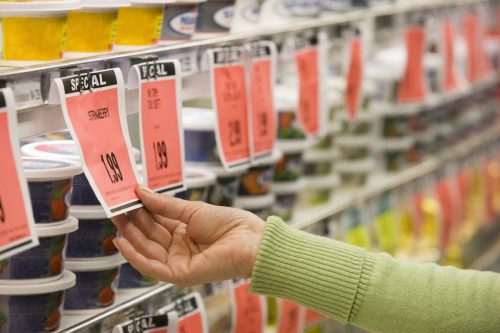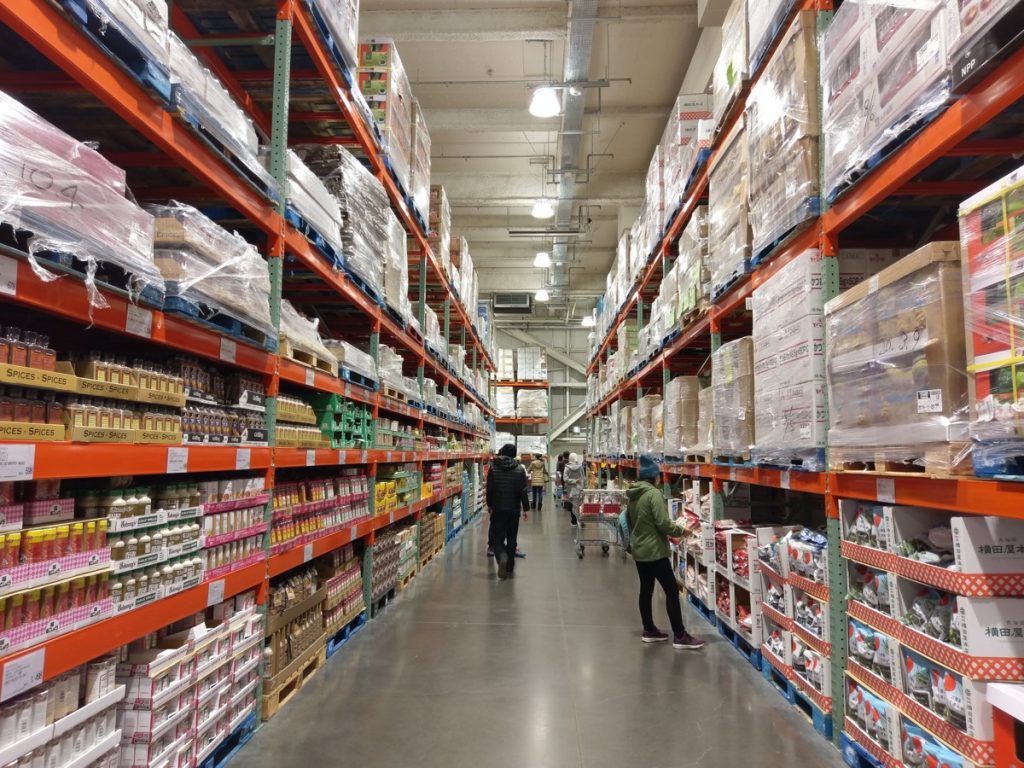11 Easy Ways to Save Money on Groceries, Experts Say

Everyone loves to save money, whether it’s when they’re shopping online or making a big ticket purchase. But when it comes to everyday spending, there’s arguably nowhere savings matter more than on your grocery bill. Being able to hold onto a few dollars when picking up food and essentials can significantly impact your budget—especially with prices where they have been recently. Read on for easy ways to save money on groceries, according to experts.
RELATED: 7 Ways to Save Money on Your Commute, According to Financial Experts.
1
Make your shopping list beforehand.

To reduce the stress of grocery shopping—or any shopping at all—it’s crucial to create a plan ahead of time by either preparing a shopping list or placing online orders, says Jennifer Seitz, Certified Financial Education Instructor (CFEI) and director of education at Greenlight.
“Research from the [National Retail Federation] NRF shows that shoppers have started their holiday shopping earlier over the past decade to distribute their expenses and avoid the stress of rushing. The same can apply to food shopping,” she explains. “Your non-perishables can be purchased in advance—with an added bonus that you don’t have to worry about last-minute low stock on any must-have canned ingredients. Having control over your budget and time eliminates uncertainty.”
2
Look for deals.

Researching what to buy isn’t just important when you’re making a big-ticket purchase. Experts say comparison shopping for groceries can still save you big.
“To stick to your budget, consider asking yourself additional questions like ‘Can I find a better deal?’ This may involve comparing brands and cost per unit on different product sizes,” says Seitz.
You can also compare prices at different stores to find the best price for the item you selected. “By doing this, you’ll be able to save money and keep extra cash in your pocket,” she explains.
You can also check the circulars of your favorite grocers online for any sales before you put your meal plan and list together.
“Building your meals for the week around the biggest savings can pay off,” Todd Stearn, financial expert and founder of the Money Manual, tells Best Life. “Buy-one-get-one (BOGO) deals especially are a terrific opportunity to stock up on pantry staples and anything you’ll use quickly. You can also take advantage of offers like BOGO meats by freezing what you can’t use if you have the freezer space.”
3
Switch from brand names to store brands.

We all have our brand loyalties for certain products. But as hard as it can be to change, sometimes opting for the generic version of an item can go a long way.
“This is a way to avoid Shrinkflation and save money,” says Trae Bodge, smart shopping expert at Truetrae.com. “Store brands often have the same ingredients as the brand name—they are sometimes made in the same factories!—and are usually much cheaper.”
Others point out that a premium price point is not always an indicator of higher quality.
“Generic brands at grocery stores can offer the same quality as name-brand items, just at a lower price point,” says Mary Hines Droesch, head of consumer, small business, and wealth management banking and lending products at Bank of America. “While it may seem like a $2 to $5 difference won’t make a dent in your total costs, saving a few extra bucks on a few items in your shopping cart can truly add up. Remember: It’s the quality, not the brand.”
4
Make a meal plan.

Looking for an added bonus to saving money? Meal planning can be good for your waistline and your wallet.
“Rising food costs can be particularly daunting for larger families. In fact, data from Greenlight shows that 55 percent of parents and teens identified inflation as their biggest financial concern,” Seitz explains. By creating a meal plan and shopping list ahead of time, you and your family can also avoid impulse purchases—which can often be a source of serious waste.
You can also consider making certain items instead of buying them pre-made. “Things like hummus and granola can be expensive at the store, but they can be made at home fairly easily for a fraction of the cost,” says Bodge.
RELATED: Always Use Cash for These 10 Purchases, Financial Experts Say.
5
Pay attention to food you’re not eating.

No one likes to run out of food in the middle of the week, but it’s arguably worse to throw away fresh ingredients that have gone bad. That’s why experts say reducing food waste can also help reduce overall food costs.
“If you regularly have unused produce or pantry items, take note so that you can be mindful about the amounts you actually consume. Then you can plan your purchases accordingly,” suggests Seitz.
6
Order some things online.

Using online grocery services is a great way to save time. But it also provides some other benefits—including the ability to save.
“Ordering online makes it easier to compare prices and use savings tools, like browser plugins,” suggests Bodge. “For example, once you’ve installed the Sidekick by CouponCabin.com, it will automatically alert you to cash-back opportunities, coupons, and free shipping offers, and it will even test coupons for you at checkout. I find this to be particularly useful when I am buying large quantities of items I use regularly.”
7
Include your children in the process.

Grabbing groceries for your family? Train your children to be frugal shoppers by involving them in the shopping.
“Consider having them take the lead on a future grocery trip. Share details about the grocery budget, including how many meals you need to prepare, how long the snacks should last, and any dietary restrictions. With a little preparation, you and your children can resist the temptation of impulse buying and avoid being swayed by in-store advertisements,” Seitz says.
This can be especially helpful when making the decision to switch brands. “This can sometimes be tricky when you have kids because they want the item that is familiar to them, but don’t be deterred: Make this a teachable moment and explain that you are switching to save money so you can afford other things they enjoy,” says Bodge.
8
Take advantage of grocery store rewards programs.

Choosing to be a repeat customer can have benefits outside of knowing how to get in and out of the supermarket quickly. That’s why Seitz says to make sure you are taking advantage of rewards.
“It could be store-specific rewards like fuel points, helping you save on both food and gas. With every dollar spent, you can earn discounts on gas, which can add up over time. Additionally, loyalty rewards programs can provide discounts at checkout, so it’s worth signing up for them,” she says.
RELATED: The 17 Worst Things to Buy at Walmart.
9
Buy in bulk.

Plenty of shoppers are devoted to warehouse retailers such as Costco and Sam’s Club because of their unique offerings and membership perks. And picking up bulk items can help you save a lot in the long run.
“If you are shopping for a larger family, consider buying in bulk with a wholesale club membership, which can save you up to 40 percent off,” Bodge says. “Smaller families can also buy in bulk but should stick to non-perishables to avoid the risk of your purchases going bad.”
10
Use the right credit card.

Credit card rewards are another option, “but make sure you understand the program and pay off the balance each month to avoid interest charges,” says Seitz.
Often, the best credit card is one with a rewards structure that aligns with your current budget and spending habits, as that will allow you to most effectively reap the rewards the card offers, says Hines Droesch.
“As your cash rewards grow, you can use your earnings to help offset costs on your next grocery run,” she adds.
11
Try using coupons.

Not all methods for saving money are necessarily new concepts. Even traditional methods such as couponing are a fantastic way to keep some money in your wallet.
“If you get the Sunday paper, do you pay attention to the coupons? It can be worth seeing if you can find coupons for products you buy,” says Stearn. “You may also want to get a couponing app or check online couponing sites or the websites of your favorite brands for more offers.”